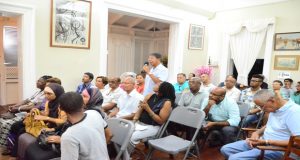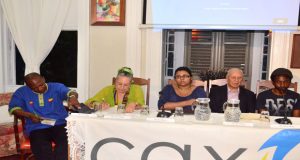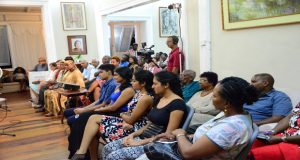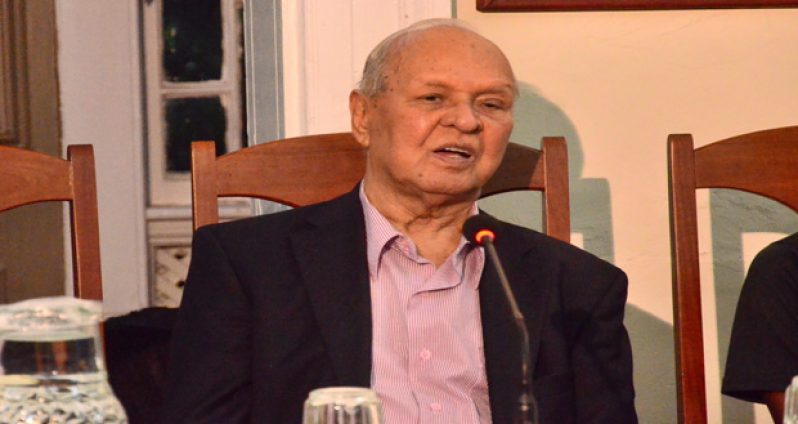LIKE any other country, Guyana is not a perfect society, and entrepreneur guru Yesu Persaud has said that if Guyanese cannot find ways to work together, they will continue to de-elevate themselves and their beloved country, Guyana.Speaking at a forum named Culture Conversation, hosted at Moray House at Camp and Quamina Streets in Georgetown, Persaud said that with exception of the Amerindians, the other peoples of

Guyana came in ships as cargoes; and the purpose for which they came was to work on the sugar plantations. And they all endured hardship, a commonality he said that should inspire Guyanese to stick together, and love and respect each other for the good of Guyana.
The looking down on one another because of ethnic and cultural differences, he said, will only add to the fear of insecurity, and would do no good for the youth and for development of this country.
Unless Guyanese appreciate who they are, Persaud said, Guyana will not be going anywhere; and will be going down instead of going up.
Emphasising his point, the lead private sector executive told the gathering of mostly persons in the arts that their ancestors came to Guyana in ships, and if they do not work together, they will go down as a sinking ship.
Persaud contends that Guyana is a fascinating country, and Guyanese should not allow hasty assertions to cloud their judgement on the beauty of national unity.
The differences of ethnic groups in Guyana, he said, is not a situation that is unique to Guyana. He pointed out that, even in some Western countries, differences exist among the Europeans.
But the ethnic groups in Guyana, he said, can overcome their differences by first appreciating each other for who they are, and resolving to work in the best interest of their country.
BRIGHT FUTURE
When all Guyanese begin working together, Persaud told the forum, themed “Different Origin — Common Future”, Guyanese will begin to achieve together, and will have a future that all can be

proud of.
He was one of five panellists at the lively, rich, and highly informative discussion. The other panellists were Francis Bailey, Sara Bharrat, Vanda Radzik, Eric Phillips and Dr Paloma Mohamed.
An academic, playwright and culture enthusiast, Dr Paloma Mohamed said that, in Guyana, there is a great tendency to talk extensively about the problems, but little about the solutions.
For Guyana to move forward, she said, Guyanese must think of a common future, begin to see differences as beautiful diversity; and stop the pointless and disgusting political blame game.
She lamented the culture in Guyana where opposing political parties do not recognise the good done by the other. Notably, when the PPP/C was in power, their narrative gave the impression that the PNC did nothing good for Guyana; and now they are in the Opposition, the new Administration seems not to see any good in them.
According to Dr Mohamed, the failure to recognise the good in each other is the reason for the “start over” whenever a new Government takes office.
She said the dismantling of this cycle will require that rival political parties recognise and acknowledge what is good and bad, and resolve to build on the good.
Francis Bailey, an accomplished musician and multimedia artist with a passion for social justice and youth work, noted the importance of culture and the bond it creates.
Culture, he said, ties a people to their homeland, and reflects the sum total of the traits of a group transported from one generation to another.
Guyana, he said, has a rich tapestry of culture, and the future of a united Guyana would require an appreciation and celebration of the differences of the people of the different ethnic groups.
The Guyanese identity, he said, remains in all, and must be shared.
ONE PEOPLE
Director of the African Cultural and Development Association (ACDA), Eric Phillips, said Guyana is a nation with one people but from different lands, and the Africans are not descendants of

slaves, but rather the enslaved.
He said the latter is not told, as he pointed to the distorted and selective history of the African people. They suffered and endured, he said, and he contended that without economic justice, there will be no common identity.
Social and sustainable development, women’s rights, and gender equality advocate Venda Radzik also addressed the forum.
She told the gathering that Social Studies, which to a large extent covers history in the early levels in school, should be dropped.
She advocated for it to be replaced with Cultural Studies, with heavy focus on music, the arts and culture. This, she said, will be a great step in ending the communicable disease called racism.
Radzik, who was once part of the Working People’s Alliance (WPA), said she is proud to have been part of the Civil Rebellion against the Burnham Administration.
During that period in the late 1970s, she was arrested and jailed with 18 other women who were peacefully picketing in support of women/housewives who had lost their livelihoods due to a clamp down on essential food items that were banned by the then Administration.
But despite this, she said, there were things that President Burnham did which were praiseworthy, and she recognised him for it. The late Guyanese leader, she said, ignited the spirit of nationalism in her, and she will forever thank him for that. Former President Bharrat Jagdeo, she said, also did good things for Guyana, and must be recognised and praised for it.
FOCUS ON SOLUTIONS
Guyanese, she said, do not “big up” themselves, and tend to focus too much on the negatives. A case in point, she said, is the media. She pointed out that while much focus is placed on crime, scant attention is paid to the solution and the reporting of what is good about Guyana.
Meanwhile, member of the Global Shapers Community, and Director on the Board of Transparency Institute Guyana Inc, Sara Bharrat, contended that politics is the source of division in Guyana.
She maintained that it instils a level of fear, and she recalled her experiences growing up in an East Indian-dominated community.
Bharrat alleged that part of her fear is peddled by a certain religious organisation with close links to the PPP/C. The organisation, she said, has managed to infiltrate the leadership of many mandirs.
The fear, she said, is passed down from one generation to another, and it is time for a united effort to ‘kick the ghost of fear out’, and for all to start listening to the other side of the story.
Radzik was also critical about religion, contending that it is man-made and does not put women in a too pleasant light. And some of the proponents of religion, she said, can be passed as anti-Christ rather than followers of Christ — the peace-loving man who reached out to all, but especially the poor and downtrodden in society.
The discussion organised by ACDA was sponsored by CGX Resources Inc. It was part of Emancipation Day observances, and was moderated by Professor Suresh Narine.
Professor Narine urged that a spirit of entrepreneurship be inculcated in the different ethnic groups, to ensure their growth and development. This, he said will redound to a better Guyana.




.png)









